VW Passat vs Land Rover Range Rover – Which model is better for everyday use?
Two cars, one duel: VW Passat meets Land Rover Range Rover.
Which one wins in performance, efficiency and value for money? Find out now!
Costs and Efficiency:
Price and efficiency are key factors when choosing a car – and this is often where the real differences emerge.
VW Passat has a decisively advantage in terms of price – it starts at 35700 £, while the Land Rover Range Rover costs 122700 £. That’s a price difference of around 87008 £.
Fuel consumption also shows a difference: VW Passat manages with 0.30 L and is therefore convincingly more efficient than the Land Rover Range Rover with 2.70 L. The difference is about 2.40 L per 100 km.
As for range, the VW Passat performs somewhat better – achieving up to 133 km, about 16 km more than the Land Rover Range Rover.
Engine and Performance:
Power, torque and acceleration are the classic benchmarks for car enthusiasts – and here, some clear differences start to show.
When it comes to engine power, the Land Rover Range Rover has a decisively edge – offering 615 HP compared to 272 HP. That’s roughly 343 HP more horsepower.
In acceleration from 0 to 100 km/h, the Land Rover Range Rover is clearly perceptible quicker – completing the sprint in 4.50 s, while the VW Passat takes 5.80 s. That’s about 1.30 s faster.
In terms of top speed, the Land Rover Range Rover performs barely noticeable better – reaching 261 km/h, while the VW Passat tops out at 250 km/h. The difference is around 11 km/h.
There’s also a difference in torque: Land Rover Range Rover pulls convincingly stronger with 800 Nm compared to 400 Nm. That’s about 400 Nm difference.
Space and Everyday Use:
Beyond pure performance, interior space and usability matter most in daily life. This is where you see which car is more practical and versatile.
Seats: Land Rover Range Rover offers clearly perceptible more seating capacity – 7 vs 5.
In curb weight, VW Passat is clearly lighter – 1573 kg compared to 2504 kg. The difference is around 931 kg.
In terms of boot space, the Land Rover Range Rover offers somewhat more room – 818 L compared to 690 L. That’s a difference of about 128 L.
In maximum load capacity, the Land Rover Range Rover performs somewhat better – up to 2176 L, which is about 256 L more than the VW Passat.
When it comes to payload, Land Rover Range Rover distinct takes the win – 846 kg compared to 577 kg. That’s a difference of about 269 kg.
Who comes out on top?
Overall, the VW Passat shows itself to be leaves the rival little chance and secures the title of DriveDuel Champion.
It convinces with the more balanced overall package and proves to be the more versatile choice for everyday use.
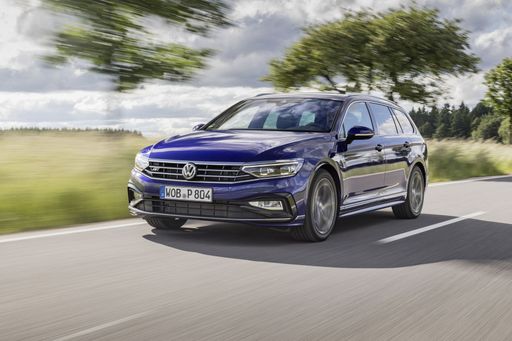
VW Passat
VW Passat
The VW Passat is a staple in the family saloon segment, known for its refined design and practicality. It effortlessly combines a comfortable ride with a spacious interior, making it a popular choice for long journeys. The cabin features high-quality materials and an intuitive infotainment system, providing a premium feel without sacrificing user-friendliness.
details @ volkswagen-newsroom.com
@ volkswagen-newsroom.com
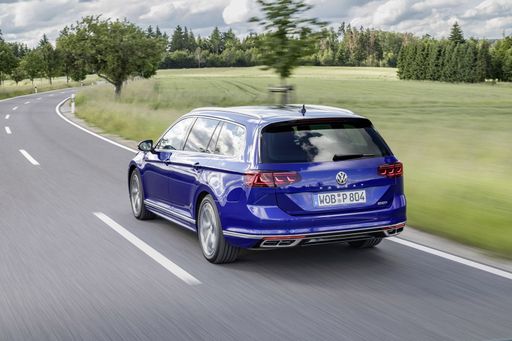 @ volkswagen-newsroom.com
@ volkswagen-newsroom.com
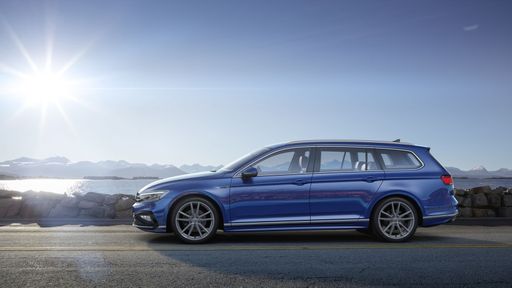 @ volkswagen-newsroom.com
@ volkswagen-newsroom.com
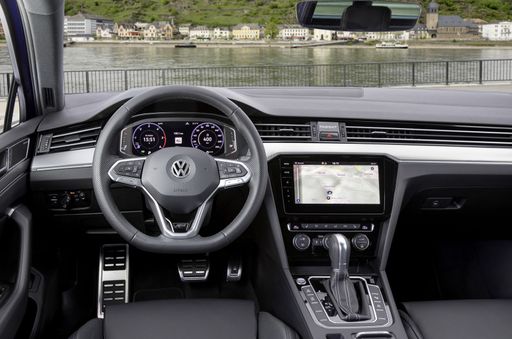 @ volkswagen-newsroom.com
@ volkswagen-newsroom.com
Land Rover Range Rover
The Land Rover Range Rover epitomises luxury and capability in the realms of off-road vehicles. Its elegant design seamlessly marries sophistication with ruggedness, making it equally suitable for urban environments and challenging terrains. Inside, passengers are treated to a plush interior with premium materials and cutting-edge technology that ensure a comfortable and connected driving experience.
details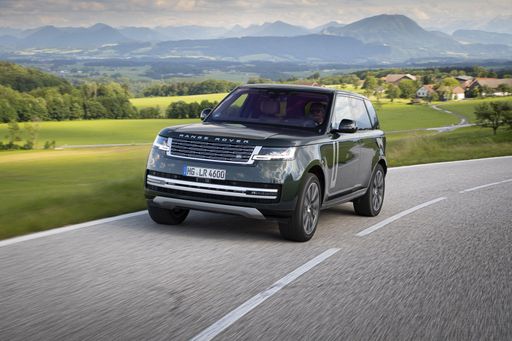 @ media.landrover.com
@ media.landrover.com
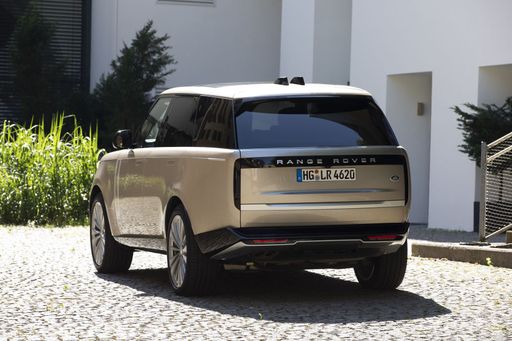 @ media.landrover.com
@ media.landrover.com
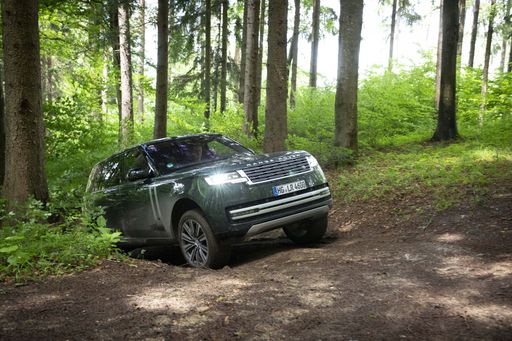 @ media.landrover.com
@ media.landrover.com
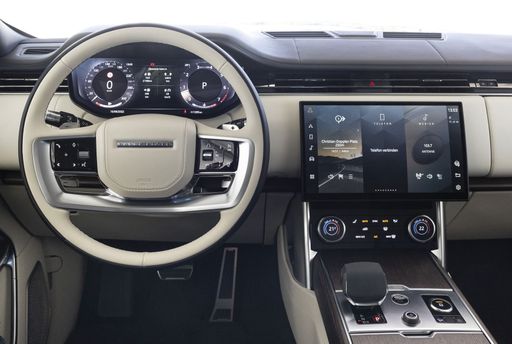 @ media.landrover.com
@ media.landrover.com

|

|
|
|
|
Costs and Consumption |
|
|---|---|
|
Price
35700 - 58500 £
|
Price
122700 - 244700 £
|
|
Consumption L/100km
0.3 - 8 L
|
Consumption L/100km
2.7 - 11.7 L
|
|
Consumption kWh/100km
-
|
Consumption kWh/100km
-
|
|
Electric Range
124 - 133 km
|
Electric Range
116 - 117 km
|
|
Battery Capacity
19.70 kWh
|
Battery Capacity
31.80 kWh
|
|
co2
7 - 181 g/km
|
co2
62 - 265 g/km
|
|
Fuel tank capacity
45 - 66 L
|
Fuel tank capacity
71 - 90 L
|
Dimensions and Body |
|
|---|---|
|
Body Type
Estate
|
Body Type
Off-Roader
|
|
Seats
5
|
Seats
5 - 7
|
|
Doors
5
|
Doors
5
|
|
Curb weight
1573 - 1858 kg
|
Curb weight
2504 - 2810 kg
|
|
Trunk capacity
510 - 690 L
|
Trunk capacity
212 - 818 L
|
|
Length
4917 mm
|
Length
5052 - 5258 mm
|
|
Width
1849 mm
|
Width
2047 mm
|
|
Height
1521 mm
|
Height
1870 mm
|
|
Max trunk capacity
1770 - 1920 L
|
Max trunk capacity
1841 - 2176 L
|
|
Payload
501 - 577 kg
|
Payload
589 - 846 kg
|
Engine and Performance |
|
|---|---|
|
Engine Type
Plugin Hybrid, Petrol, Petrol MHEV, Diesel
|
Engine Type
Plugin Hybrid, Petrol MHEV, Diesel MHEV
|
|
Transmission
Automatic
|
Transmission
Automatic
|
|
Transmission Detail
Dual-Clutch Automatic
|
Transmission Detail
Automatic Gearbox
|
|
Drive Type
Front-Wheel Drive, All-Wheel Drive
|
Drive Type
All-Wheel Drive
|
|
Power HP
122 - 272 HP
|
Power HP
300 - 615 HP
|
|
Acceleration 0-100km/h
5.8 - 10.7 s
|
Acceleration 0-100km/h
4.5 - 6.6 s
|
|
Max Speed
212 - 250 km/h
|
Max Speed
218 - 261 km/h
|
|
Torque
250 - 400 Nm
|
Torque
650 - 800 Nm
|
|
Number of Cylinders
4
|
Number of Cylinders
6 - 8
|
|
Power kW
90 - 200 kW
|
Power kW
221 - 452 kW
|
|
Engine capacity
1498 - 1984 cm3
|
Engine capacity
2997 - 4395 cm3
|
General |
|
|---|---|
|
Model Year
2024 - 2025
|
Model Year
2025
|
|
CO2 Efficiency Class
B, G, D, E
|
CO2 Efficiency Class
B, G
|
|
Brand
VW
|
Brand
Land Rover
|
What drivetrain options does the VW Passat have?
The VW Passat is offered with Front-Wheel Drive or All-Wheel Drive.
The prices and data displayed are estimates based on German list prices and may vary by country. This information is not legally binding.
